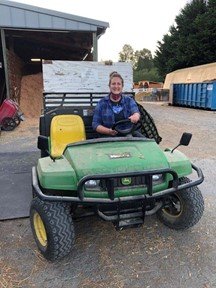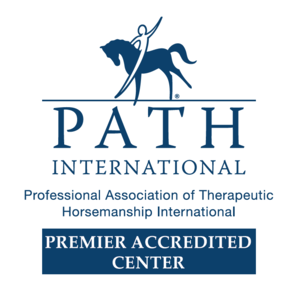Photos courtesy of Sanda Anderson.
It starts every morning at 6 a.m. The Little Bit herd is greeted with a cheery good morning from one of the barn staff specifically trained to provide the morning feeding. Like many top athletes, the Little Bit horses have a full team of professionals working with them – nutritionists, massage therapists, chiropractors, trainers, and custom shoers. The health and safety of every Little Bit herd member is the number one priority of the equine staff, and a complete diet specifically catered to their individual needs makes sure that they stay healthy and ready to work.
Like humans, each horse has its unique feeding needs. Kelly, one of Little Bit’s morning feeders and barn staff, knows just what each Little Bit herd member gets for breakfast. She begins the morning by loading up the quad with an assortment of timothy and alfalfa hay and delivers it to each member – some of which get their hay tossed on the ground or placed in nets. As foragers, horses benefit from eating small mouthfuls over longer periods of time. The nets that are used provide a slight barrier to the hay which simulates this process. Once all the horses have been fed their hay, Kelly returns to the barn to prepare every horse’s favorite food – the grain!
Individual buckets are filled with an assortment of high-quality grains and supplements that have been hand selected for each horse, providing additional calories and nutrition based on their diets. Kelly fills the quad with the buckets and delivers them to each of the horses who have been patiently waiting. Horses require a number of nutrients to survive: fiber, fats, carbohydrates, protein, vitamins, minerals, and most importantly, clean fresh water. Hay provides the fiber they need while the grains and supplements provide the rest. Horses’ digestive systems are made for their grazing habits - smaller meals eaten throughout the day. Horses are also known for having “eyes bigger than their stomachs,” so if they overeat or eat something poisonous, they cannot regurgitate the food. This means that monitoring their intake throughout the day is always important. The barn staff at Little Bit are well aware of this and watch for signs of digestive issues each and every day.
Once all the horses have been fed their morning hay and grain and are happily eating away, Kelly returns to the barn to prepare for the morning’s program participants. Additional barn staff arrive to help, and Little Bit starts buzzing with volunteers, staff, patients, and riders. It’s another great day at Dunmire Stables!
Written by Sanda Anderson










